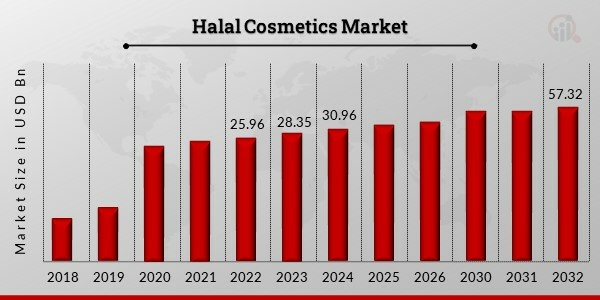Halal Cosmetics Industry Growth and Trends
In 2023, Halal Cosmetics Market Size was estimated to be worth USD 28.35 billion. It is anticipated that the Halal Cosmetics market would expand at a compound annual growth rate (CAGR) of 8.00% from 2024 to 2032, from USD 30.96 billion to USD 57.32 billion. The primary factors propelling market expansion are growing concerns regarding the quality of skin care products and the growing need for hygiene goods. The Halal Cosmetics Market has been experiencing remarkable growth due to increasing Muslim populations, rising disposable incomes, and heightened awareness of ethical and natural beauty products. According to industry reports, the market is projected to witness substantial growth in the coming years, driven by demand in key regions such as the Middle East, Southeast Asia, and parts of Europe and North America. Consumers are becoming more conscious about the ingredients used in their beauty products, leading to a shift towards clean, ethical, and halal-certified alternatives.

In addition, non-Muslim consumers are also contributing to the growth of halal cosmetics. The clean beauty movement, which emphasizes natural and toxin-free ingredients, overlaps with halal beauty principles. As a result, many individuals seeking vegan, cruelty-free, and eco-friendly options are gravitating toward halal-certified cosmetics. This trend has encouraged global cosmetic brands to incorporate halal-certified lines in their product portfolios, further expanding the market.
“Free Sample Copy” – Access a complimentary copy of our report to explore its content and insights
https://www.marketresearchfuture.com/sample_request/6665
Leading Players and Product Innovation
The halal cosmetics market is witnessing the entry of both established beauty brands and emerging startups. Companies such as Amara Halal Cosmetics, Inika Organic, PHB Ethical Beauty, Wardah, Iba Halal Care, and Clara International are leading the industry by offering a diverse range of halal-certified products, including skincare, makeup, fragrances, and haircare items.
Key Companies in the Halal Cosmetics Market include:
- PHB Ethical Beauty
- MMA Bio Lab Sdn Bhd.
- Inika
- Amara Cosmetics
- Clara International
- Iba Halal Care
- Sampure Minerals
- Wipro Unza,
- Wardah Cosmetics
- Halal Cosmetics Company
- Talent Cosmetics Ltd
- One Pure
- Ivy Beauty Corporation Sdn Bhd.
- Brataco Group of Companies
- Mena Cosmetics
- Paragon Technology and Innovation
- Martha Tilar Group
- Saaf Skincare
Innovation is a key driver in this industry, with brands focusing on plant-based ingredients, sustainable packaging, and multifunctional beauty solutions to attract a wider audience. Advanced formulations featuring botanical extracts, halal-certified collagen, and naturally derived color pigments are gaining popularity. Additionally, technological advancements in halal testing methods and product verification are further enhancing the credibility of halal beauty brands.
Key Drivers of the Halal Cosmetics Market
- Rising Muslim Population and Disposable Income: With the global Muslim population surpassing 1.9 billion, the demand for halal-certified products continues to rise. Countries with significant Muslim populations, such as Indonesia, Malaysia, Saudi Arabia, and the UAE, are witnessing a surge in halal beauty consumption. The increasing middle-class income in these regions is further fueling demand for premium halal beauty products.
- Ethical and Clean Beauty Trends: As more consumers become concerned about the safety and ethical sourcing of their beauty products, halal cosmetics are gaining traction. These products are often free from harmful chemicals, ensuring they meet the highest purity and safety standards. The market’s alignment with organic, vegan, and cruelty-free trends also broadens its consumer base.
- Regulatory Support and Certification Standards: Governments and Islamic certification bodies are strengthening halal regulations and guidelines to ensure compliance and authenticity. Certifications from organizations such as JAKIM (Malaysia), MUI (Indonesia), and the Halal Certification Authority (HCA) help build consumer trust and drive sales.
- E-commerce and Digital Marketing Expansion: The rapid growth of e-commerce platforms and social media has revolutionized the halal cosmetics market. Digital marketing strategies, influencer collaborations, and online retail have enabled halal beauty brands to reach a global audience, making it easier for consumers to access a wide range of halal-certified products.
Challenges in the Halal Cosmetics Market
Despite its promising growth, the halal cosmetics industry faces several challenges that need to be addressed to ensure sustained expansion.
- Certification Complexities: Obtaining halal certification can be a lengthy and costly process, as different countries have varying regulatory requirements. This can be a hurdle for small and medium-sized enterprises (SMEs) looking to enter the market.
- Limited Consumer Awareness: While halal beauty is gaining recognition, many consumers remain unaware of the differences between halal, vegan, and cruelty-free cosmetics. Educating consumers about halal certification and its benefits is essential for market penetration.
- High Production Costs: Formulating halal cosmetics requires strict adherence to specific ingredient sourcing and manufacturing processes. This can lead to higher production costs, which may impact pricing and affordability for certain consumer segments.
“Proceed to Buy” – Move forward with your purchase and gain instant access to the complete report
https://www.marketresearchfuture.com/checkout?currency=one_user-USD&report_id=6665
Future Outlook and Opportunities
The future of the Halal Cosmetics Market looks promising, with continued expansion into new regions and demographic segments. As consumer preferences shift towards ethical and sustainable beauty solutions, the demand for halal-certified products is expected to rise significantly. Brands that incorporate inclusive marketing strategies, transparent sourcing, and high-quality formulations will be well-positioned to capitalize on this growing market.
Discover more Research Reports on Consumer-and-Retail Industry, by Market Research Future:
Laundry Detergent Pods Market Research Report Forecast Till 2034
Cruelty-Free Cosmetics Market Research Report Forecast Till 2034
Sleepwear Market Research Report Forecast Till 2032
Consumer Packaged Goods Market Research Report Forecast Till 2032
Furniture Market Analysis Research Report Forecast Till 2032
About Market Research Future:
Market Research Future (MRFR) is a global market research company that takes pride in its services, offering a complete and accurate analysis with regard to diverse markets and consumers worldwide. Market Research Future has the distinguished objective of providing optimal quality research and granular research to clients. Our market research studies by products, services, technologies, applications, end users, and market players for global, regional, and country level market segments, enable our clients to see more, know more, and do more, which help answer your most important questions.
Contact Us:
Market Research Future (Part of Wantstats Research and Media Private Limited)
99 Hudson Street, 5Th Floor New York, 10013
United States of America
+1 628 258 0071 (US)
+44 2035 002 764 (UK)
Email: info@marketresearchfuture.com
Website: https://www.marketresearchfuture.com/
https://www.wiseguyreports.com/
Media Contact
Company Name: Market Research Future
Contact Person: Media Relations
Email: Send Email
Country: United States
Website: https://www.marketresearchfuture.com

